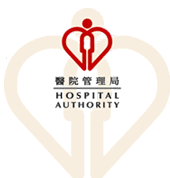 |
 |
 |
| |
 |
| |
|
| |
 ith several thousand participants, various kinds of support teams and other volunteers and staff members, the Oxfam Trailwalker is a very large-scale annual fundraising event. But did you know that the 250-strong medical team which has been supporting it ever since 1996 is made up of our colleagues from Kowloon Central Cluster (KCC)? ith several thousand participants, various kinds of support teams and other volunteers and staff members, the Oxfam Trailwalker is a very large-scale annual fundraising event. But did you know that the 250-strong medical team which has been supporting it ever since 1996 is made up of our colleagues from Kowloon Central Cluster (KCC)?
"The event was originally organised by the Brigade of Gurkhas, with Oxfam Hong Kong in charge of its fundraising aspects. When the Gurkhas left in 1997, Oxfam Hong Kong picked up the baton and assumed all-round responsibility for it. Mr Chong Chan-yau, who was Oxfam's Director of Fundraising and Outreach at the time, felt apprehensive that the Trailwalker might become disorderly after the handover. In 1996, he told his good friend Dr York Chow, who was Hospital Chief Executive of Queen Elizabeth Hospital (QEH), about his concerns. Dr Chow responded by asking his Hospital's medical and allied health staff if they would volunteer to form a medical support team for it." One of the team's first members was Dr HF Ho, the Chief of Service (Accident & Emergency) at QEH, and he has been coordinating its work ever since.
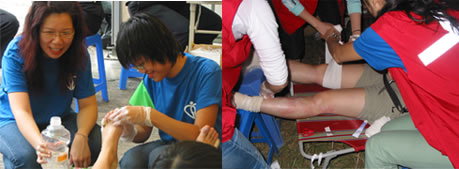 |
 |
The team is ready to handle all kinds of medical problems during the three-day event. |
|
 |

The Trailwalker route weaves up and down the steep slopes of the MacLehose Trail. It is 100 kilometres long, and the walkers have to complete it within 48 hours. So it's almost inevitable that some of them are suffering from cramp, muscular and kneecap pains when they arrive at the nine checkpoints along the way.
And things can become a great deal worse if the weather turns bad. For instance, in the year 2000, there was a sudden downpour halfway through the event. Everyone got caught in it, and the temperature on the mountainside suddenly plunged to below 10°C. "The participants had already been walking for more than 30 hours, and they were all exhausted by the time they arrived at Checkpoint 7 on Tai Mo Shan. Some even had hypothermia because of the rain," Dr Ho recalls.
He faced the dilemma of whether or not to recommend halting the event. It was a decision neither the Gurkhas nor Oxfam Hong Kong had ever needed to take before, and it was a difficult one. If they stopped now, how could they evacuate the walkers? And how would the rescuers get up the hillside to reach them? "After weighing up the pros and cons, I finally advised the organiser to stop the hike, even though it would affect its success as a fundraising event," he says.
|
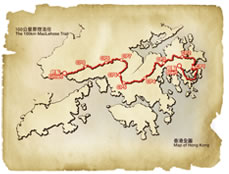 |

In his book Trailwalker, Tony Tsoi writes: "Some don't dare to return to do it again, yet even more have become addicted to it". Dr Ho is obviously one of the latter, and he's keen for his colleagues to share the experience. For example, he invited A&E Nursing Officer Ms Elain Yip to join the team.
"I had always been interested in the Trailwalker, so I agreed almost immediately," says Ms Yip. "The 2003 SARS outbreak made a deep impression on me, and I was thankful that my family and I were able to get through it. So I decided that I wanted to repay the community for its support to me by undertaking some charity work."
Ms Yip explains that the team's preparations for the three-day event normally held in November start early in the year. As well as attending meetings with the organisers, her Cluster has several rounds of internal discussions. As the team's nursing officer, Ms Yip needs to liaise with a number of departments, such as the Central Sterile Supplies Department, Pharmacy Department and Public Affairs Department. She does all this in her spare time.
Providing such essential support to a large-scale activity is no mean feat. Has Ms Yip ever thought about giving up her role in it? "Of course, there are difficulties, but my teammates are always there whenever I encounter them. And we sort it out together. Besides the front-line support of our medical colleagues, and our supporting colleagues who take care of the pre and post-event work, some retired colleagues also come back to help out," she says. 
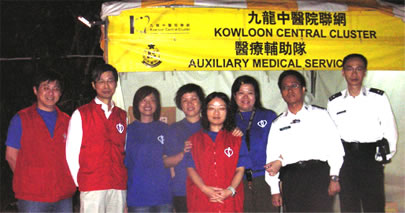 |
 |
The KCC's Cluster Chief Executive Dr CT Hung (second from left) encourages team members at one of the checkpoints in 2007. |
|
|

The proceeds from the Oxfam Trailwalker support local and overseas poverty alleviation and emergency relief projects by Oxfam Hong Kong. In recognition of its caring spirit, sponsorship and professional support for the event for more than 10 years, KCC has been awarded a "Caring Organisation Logo" by the Hong Kong Council of Social Service for two consecutive years (2007-08 and 2008-09).
|
|
|
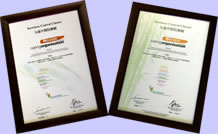 |
|
|
|

